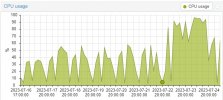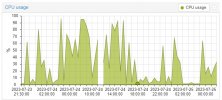But,
mean "Disable mitigations as kernel options" , performance not dropped , but Vulnerable , it's personnal choicetry with mitigations off and ksm disabled
Code:
Model name: Intel(R) Xeon(R) CPU E5-2620 v2 @ 2.10GHz
Stepping: 4
CPU MHz: 1197.122
CPU max MHz: 2600.0000
CPU min MHz: 1200.0000
BogoMIPS: 4189.95
Virtualization: VT-x
L1d cache: 192 KiB
L1i cache: 192 KiB
L2 cache: 1.5 MiB
L3 cache: 15 MiB
NUMA node0 CPU(s): 0-11
Vulnerability Itlb multihit: KVM: Vulnerable
Vulnerability L1tf: Mitigation; PTE Inversion; VMX vulnerable
Vulnerability Mds: Vulnerable; SMT vulnerable
Vulnerability Meltdown: Vulnerable
Vulnerability Mmio stale data: Unknown: No mitigations
Vulnerability Retbleed: Not affected
Vulnerability Spec store bypass: Vulnerable
Vulnerability Spectre v1: Vulnerable: __user pointer sanitization and usercopy barriers only; no swapgs barriers
Vulnerability Spectre v2: Vulnerable, STIBP: disabled, PBRSB-eIBRS: Not affected
Vulnerability Srbds: Not affected
Vulnerability Tsx async abort: Not affected
Last edited:



